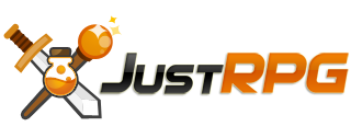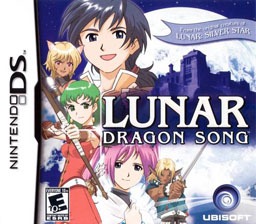Lunar: Dragon Song
Lunar: Dragon Song is a turn based role playing game that was developed by GameArts and released for the Nintendo DS on September 27, 2005.
| Developer: GameArts Publisher: Ubisoft Release Date: September 27, 2005 Platforms: DS JustRPG Score: 60% Pros: +Appealing characters. +Great dialogue +Good story line. Cons: -Horrible controls. -Unoriginal combat system. -Much worse than previous Lunar titles. |
Lunar: Dragon Song Overview
Lunar: Dragon Song is a traditional turn based role playing game that was released for the Nintendo DS in late 2005. The game implements a simple turn based combat system which is identical to other games such as the early Final Fantasy titles. The story is very well done and the characters are charming, but the controls out of combat which the player uses to travel the game world are very poorly designed. If you are a big fan of the Lunar series this game could be worth playing but for everything else the controls are simply unusable.
Lunar: Dragon Song Screenshots
Lunar: Dragon Song Featured Video
Lunar: Dragon Song Review
| Lunar: Dragon Song was the game that I wanted to love, and say was a welcome return of theLunar series. Unfortunately, the game as a whole is far too hit-and-miss to receive many accolades. |
|
Admittedly, the Lunar series was never about pushing boundaries, quite the contrary. The Lunar remakes on the PlayStation were simple games with simple stories, that probably should not have garnered much attention when surrounded by technically better games. However, the quaintness mixed with the incredible localization of Working Designs helped to conceal the dated graphics and present the solid RPGs with so much flair that they developed quite the fan base. A Game Boy Advance remake of Lunar: Silver Star Story further showed how, without Working Designs, the Lunargames were solid RPGs that lacked the finesse that created true classics. The DS entry, unfortunately, takes even more of a step back than the solid GBA entry, and is a shell of what could have been a very fun RPG, and an excellent new chapter in the Lunar series. |
| Where Lunar: Dragon Song succeeds is graphically. The isometric style is quite nice, the backgrounds are lush, while the character sprites are all detailed. The menu system is very nice to look at, all of the items have their own pictures, and the symbols have a cute hand-drawn circle around them which adds to the juvenile nature of the game. The graphics also look nice when looking at the map screen, where a small super-deformed sprite moves around a very nicely detailed map so you can choose which area of a town or the world to enter next. These areas are awfully cute and fit in very well with the graphics in the exploration areas of the game. |
| Aurally, the game is a pleasure as well. While the music is a bit random from place to place, the tunes all sound very nice. The battle music could be a bit more rousing, but otherwise the songs in this game all sound quite nice. A very nice addition is the ability to listen to any of the music in the game at any time, and it can be simply accessed through the menu system. This feature was quite welcome, because the title theme and some other tracks almost beg to be listened to again. On the downside, sound effects fit their appropriate actions, and do little other than that. |
|
As far as the storyline goes, Lunar: Dragon Song is the same as the other Lunar games, a simple and trite story that’s brought to life by the mere fact that it’s delivered by cute and accessible characters. This story had potential to soar, but instead is marred by an awkward localization. There are severe typos throughout the game’s dialogue that detract heavily from the story line. Some of the statements that characters make are so awkwardly written that it’s often confusing. Working Design’s translations were always spot on and filled with humor and jokes, but this translation seems to come up short in comparison to Working Design’s translations, and any other localized games that have been released recently. |
| In battle the game doesn’t quite fare as well as it does in other areas. The enemies all look nice, but their movements are stilted to say the least. The character sprites in battle look nice but are heavily pixilated, which is a bit of an eyesore considering how nice they look outside of battle. The attacks and magic used in this game have animations that range from very nice to very simple. Despite the graphical shortcomings in battle, the game doesn’t suffer too much due to the detailed graphics of the world outside of battle. |
| The other problem with battle is a problem that carries through the rest of the game, the very puzzling gameplay. In battles you can choose to either attack, use a special attack, or use an item. When items are used, the player can choose the target. The same goes for special attacks. Regular attacks, which you will use most frequently (especially during the beginning hours of the game when the only character with special attacks has healing magic that costs an obscenely large amount of MP), choose their target automatically. This could have worked out in a way similar to Riviera: The Promised Land, where each attack affects a certain area of the battlefield. Unfortunately, it doesn’t work out quite as well, and will usually have your characters all teaming up to attack one random enemy. The enemy that they choose to attack isn’t even necessarily the most powerful enemy, which can lead to a couple of “game over” screens when the player gets unlucky. On the plus side of the battle system, it can be done using the touch screen or with the d-pad and button presses. Also, escaping can be done by blowing into the microphone, but it doesn’t always work. |
|
The major issue with battles is their spontaneous difficulty level, and this can be alleviated in two different ways. The player can buy better equipment to let their party be ridiculously overpowered compared to the enemies they are facing, or the player can level up and hope that it will help. Unfortunately, leveling up doesn’t have the large effect necessary to make battles any easier, and it usually takes three or four levels just to see an evident change. Buying equipment wouldn’t be so bad if money were more easily acquired. |
| Most enemies don’t drop money, instead the player has a choice of gaining experience from enemies or gaining items. Items can be used for Gadd’s Express quests, which are mainly fetch quests that involve gathering a grocery list of items and bringing them to a certain person for money. Sometimes, the player simply has to deliver a package from a Gadd’s Express in one town to a Gadd’s Express in another town, which is a quest that doesn’t require as much effort or time as gathering items through battle, but the money gained is significantly less. The Gadd’s Express missions, for the most part, are just tedious fetch quests, and to gain an adequate amount of money from them, the player must undertake a couple of them. Gathering the items requires fighting enemies, and since you’re not gaining any experience points (in this game referred to as Althena Conduct) from them the battles aren’t getting any easier. Running around dungeons to find these enemies is simple enough, as the enemies appear on the screen and all the player has to do is touch them, but running costs HP which can slow down the pace early on in the adventure. This system would have been nice for side quests, but it instead boils down to busywork that is almost made necessary due to the hit-or-miss battle system. |
| It truly is a shame that the flaws in this game so heavily outweigh the positives. The story is cute and simple, like all the Lunar games, but is held back by a questionable localization. The musical pieces are very nice, especially for a handheld game, while the sound effects are uninspired. The graphics in the game are nice and stylized, but the battle effects are a bit lackluster. Choosing between experience or items gained after battles is a design choice that really doesn’t make that much sense. The Gadd’s Express jobs are far too tedious and require far too much work for such miniscule pay off. Lunar: Dragon Song certainly has potential but merely fails to fulfill it. As it stands, Lunar: Dragon Song is an RPG that is playable and could offer some enjoyment, but is flawed on so many other levels that it fails to excite. |
| Final Grade: 60% |














